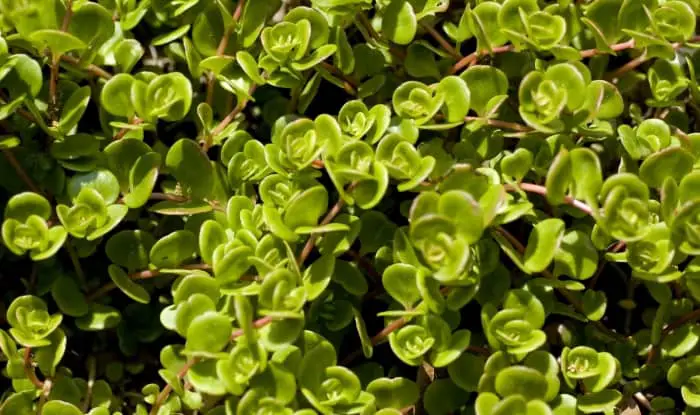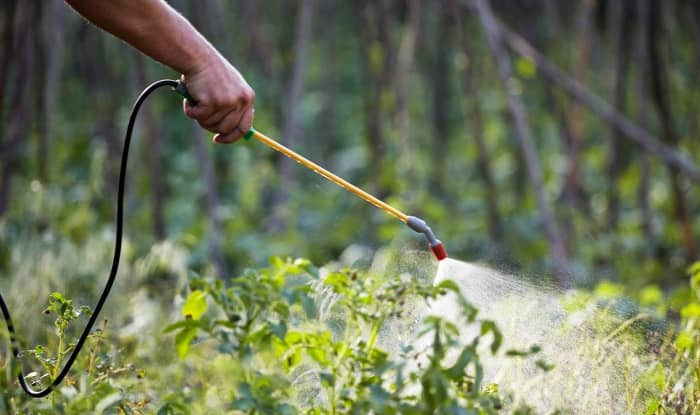Deep-rooted weeds provide a challenge to gardeners. They can be hard work to remove. And failure to eliminate the root system often leads to the weeds growing back.
So in this article, we take a look at how to get rid of deep-rooted weeds, focusing on the best methods for taking care of the problem.
Let’s dive in!
Digging Out The Deep-Rooted Weeds
Admittedly, it can be hard work. But when it’s done right, digging deep-rooted weeds out of the ground is one of the most effective ways of removal.
Deep-rooted weeds are often, but not always, perennial weeds — weeds that grow back each year from the same root system. And they pose an extra challenge compared to shallow-rooted weeds because it’s more difficult to completely get rid of the roots.
But one of the big pluses of removing weeds by hand is that you can ensure you don’t leave any root pieces behind. This prevents the weeds from regrowing.
Because hand pulling is difficult with deep-rooted weeds, it’s a good idea to use a weeding tool to help you. This can be as simple as a garden spade. Or you can use a special tool for the job, such as a corkscrew weeder.
Here’s how to use a spade to remove weeds with deep roots:
-
First, make sure the ground around the weed is wet. If it’s dry, water the area. This makes it easier to dig into the soil and lift the weed out.
-
Dig around the weed and underneath it. Take care to ensure you’re taking as much of the roots as possible
Place the spade head under the weed and lever it up from the ground. -
Sift through the soil in the hole with your hands or a trowel to remove any leftover pieces of roots that you can find.
-
Don’t leave the weeds lying on the ground. Some weeds can reroot from stem nodes or the roots, so dispose of the weeds carefully.
Use A Corkscrew Weeder
A corkscrew weeder is one of the best tools for pulling weeds with deep roots out of the ground. As the name suggests, the corkscrew weeder helps you pull weeds using a corkscrew motion that minimizes damage to your grass.
Using a corkscrew weeder is easy. You screw the sharp tip of the weeder into the soil around the weed using a clockwise turning motion as you press down. Once you’ve screwed the weeder into the ground, you pull it up, popping the weed from the soil at the same time. To make the job easier, you can get corkscrew weeders long enough for you to work while standing.
A corkscrew weeder is particularly useful for removing weeds with taproots such as dandelions. But for garden weeds with more extensive root systems that cover a larger area, it’s not the right tool for the job.
That’s when you might need to turn to a chemical herbicide.
Use A Chemical Herbicide
One of the easiest and most effective ways to kill deep-rooted weeds is to use a chemical herbicide.
To prevent the weed from growing back, you’ll need to kill the roots. So make sure you use a systemic weed killer.
Plants absorb systemic weed killers through their leaves. Once inside, the herbicide is transported around the weed, including the roots. The chemicals interfere with essential biochemical pathways, inhibiting growth and eventually killing the weed.
Chemical herbicides are particularly useful if the deep-rooted weeds have an extensive root system that’s extremely difficult to dig out. They’re also convenient when removing weeds from a large area, where digging out all of the weeds may be impractical.
Are the deep-rooted weeds growing in your lawn?
If so, you can use a lawn weed killer. These selective weed killers target broadleaf weeds while leaving your lawn grass unharmed.
Natural Herbicide
Not everyone likes using chemical herbicides in their yard. But there is a natural and organic alternative for clearing a weedy garden.
High-strength vinegar of around 20-30% acetic acid concentration burns weeds on contact. If you soak the majority of the weed above ground, it will quickly die and start to disintegrate.
Sometimes you need to repeat the treatment multiple times as the weeds might grow back from the roots. Soaking the root zone with vinegar can damage the roots. But repeatedly killing the plant above ground stops it from photosynthesizing, eventually exhausting the roots and preventing growth.
Remember to wear protective gear when using high-strength vinegar. And keep children and pets out of the area while you spray. As it’s an acid, high-strength vinegar can burn your skin upon contact.
Cut The Weeds Down
Another simple way of killing deep-rooted weeds is to cut them down.
One of the best tools for this job is a scuffle hoe. By dragging the blade through the surface of the soil, you can slice the weeds down just below ground level, cutting the stalks away from the roots. And because a scuffle hoe has a long handle, you won’t have to bend down to the ground while you work, reducing the strain on your back.
Using a hoe is a good choice if the ground is flat. But it can be awkward on uneven ground. And because you’re not removing the roots, the weeds will often attempt to grow back. So repeated cuttings may be necessary to exhaust the root system. Keep an eye on the area. And cut the weeds as soon as you notice them emerge. It’s a lot easier when they’re small.
You Might Also Like:



we have a green weed in the garden that has gone every where its green and yellow roots i have tried to get rid of it for years used salt and i was going to try white vinegar it kills the plants and climbs up the brick borders how do i get rid of this week.
Hi Paul,
Using a systemic herbicide that kills weeds to the roots is probably the quickest way. Otherwise, you will have to manually remove the weed and all its roots, rhizomes, runners, etc to prevent it from growing back.
We have had Evening Primrose now for a 2nd year. 1st year was confied to back yard, now all over our 1 1/2 acre part of Heaven.
Thinking they were Buttercups we didn’t do too much about them.
Now a real headache!
30-40percent vinegar kills to tops but not root. But digging them out is easier. And the vinegar is not as toxic as other chemicals(so I am told).
But yes, the digging part is a whole lot easier after a rain. I use a short handle small spade, cause I am short. Also, discard blooms before they open.